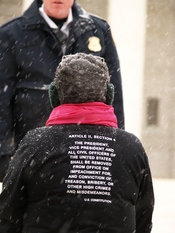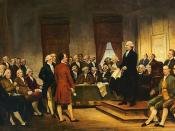Treason, Terrorism, and Wartime Crimes 12
Treason, Terrorism, and Wartime Criminal Justice
Caroline Chipen
POL303: The American Constitution
Instructor: Andrew McAdams
April 23, 2012
Treason, Terrorism, and Wartime Criminal Justice
Throughout the proud history of the United States the acts of treason, terrorism and criminal justice during times of war have taken on a variety of forms. From the Sedition Act of 1798 straight down to the current war on terror, the Constitution and its amendments have been tested to guarantee national security. To grasp a better understanding of this we must first look at what treason and terrorism are and what effects they have had in the diminution of civil liberties during times of war.
Treason is classified as: "The betrayal of one's own country by waging war against it or by consciously or purposely acting to aid its enemies" (Wehl, 1950). Under Article III, Section 3, of the United States Constitution, any person who encourages war against the United States or supports its enemies by giving them "aid and c omfort" has therefore committed treason within the implications outlined in the Constitution (Davenport, 2009).
The term aid and comfort pertains to any act that displays a betrayal of allegiance to the United States, such as furnishing enemies with weapons, soldiers, transport, housing, and/or classified information. If a dissident act has any potential to weaken the power of the United States to assault or defend against its enemies, aid and comfort has thus been given.
The Treason Clause applies to disloyal acts that are committed during wartime. Acts of disloyalty during peace are not considered treasonous under the guidelines of the Constitution. Any acts of e spionage that are committed on behalf of an ally are not considered treason during times of peace. For example, in 1951,


